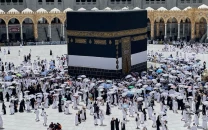Comment: The Pakistan of the 60s and that of today
The economic growth, once in the upper bracket of the league of developing countries, has now slid close to the bottom

Jinnah understood that any attempt to introduce separate electorates or to compel any citizen to declare his religion and to exclude him from the electoral rolls if he doesn’t would be a negation of not only of democracy but also of governance. GRAPHIC: EXPRESS/FILE
I often wonder what happened to Pakistan of the 1960s. The Pakistan that the youth idealised, the Pakistan full of hope for the future.
The government then may have been authoritarian but was not oppressive. Indeed, Ayub Khan was a dictator but, with his avuncular figure, did not behave like one.
The civil servants worked with commitment and justice were not held hostage to fear or prejudice. The advent of Zulfikar Ali Bhutto and the forces his public outbursts let loose called into question the very basis of a democratic polity, which is that power must be checked whether exercised by a ruler or a rabble.
The country, alternating between the elected and military regimes, has not seen stability since then. The economic growth, once in the upper bracket of the league of developing countries, has now slid close to the bottom.

The man and the vision
Support for one or the other ideology is drawn from the pronouncements of Quaid-e-Azam Muhammad Ali Jinnah, but the principles of governance he spelled out were, in fact, clear cut.
Jinnah’s response to a reporter in Delhi who wanted to know whether Pakistan would be secular or theocratic speaks volumes about his vision. “You are asking me a question that is absurd. I do not know what a theocratic state means,” retorted the Quaid instantly.
At this, another reporter interjected to say that it could mean that “non-Muslims would not be equal citizens”.
“I am afraid you have not studied Islam. We learned democracy 1,300 years ago,” was Jinnah’s equally blunt reply.
In this way, Jinnah understood that any attempt to introduce separate electorates or to compel any citizen to declare his religion and to exclude him from the electoral rolls if he doesn’t would be a negation of not only of democracy but also of governance. He reiterated that very principle with greater emphasis in his oft-quoted inaugural address to Pakistan’s constituent assembly which, in essence, said that religion had nothing to do with the business of the state.
After him, the two got mixed up and became a chief cause for the separation of East Pakistan.

Serving the people no more
It is important to delve into the views of the Quaid on the conduct of the career civil servants and their place in the state he almost single-handedly created.
He told the civil servants on two occasions to have no concern with politics, nor let ministers interfere with their duty to the people. He promised them “security and safeguards” against any harm for defying the orders of the politicians contravening this principle.
The Quaid did not live long enough to incorporate his assurance in the Constitution but whatever security and safeguards were there then no longer exist. A culture of patronage and compliance has overwhelmed the administrative structure and leaves little room for dissent to protect the interests of the people against any individual or party in power.
The boot now is on the other leg. Most civil servants themselves seek partnership with the politicians rather than assert their neutrality. Their chief concern is to get lucrative assignments which, after all, come easier with the help of the politicians.
Honest political leaders, tribunals and courts often do come to the help of wronged civil servants but cannot change the collective behaviour of the whole lot. Junior officials can be observed lining up in the Supreme Court to seek remedy against the wrongs done to them. However, the service tribunals are either inaccessible or unsympathetic.
Back to basics
To reorient the administration to serve the people, the first and inescapable condition is recruitment on merit. The superior courts have already blazed the path by enforcing the rule of competitive selection for the heads of the public sector corporations.
The parliament can pick up the thread by enacting laws that make competitive entry and promotion in the executive and judicial services a rule which no authority is able to violate on any pretext whatsoever.
An important ingredient of such an arrangement is that in case of disagreement the decision must lie with the higher authority. Thus, if the head of a department and minister in-charge disagree, the chief executive of the province or the country, as the case may be, must who is conforming to the rule of law.
And yet, all these legal and procedural safeguards can still not prevent maladministration if civil servants continue to owe their positions to politicians. Selection and promotion on competitive merit is, therefore, the crux of it all.
The meritorious youth are increasingly seeking careers in the private sector, leaving the public service at the mercy of the mediocre. This must be addressed.
kunwaridris@hotmail.com
Published in The Express Tribune, August 14th, 2013.



















COMMENTS
Comments are moderated and generally will be posted if they are on-topic and not abusive.
For more information, please see our Comments FAQ